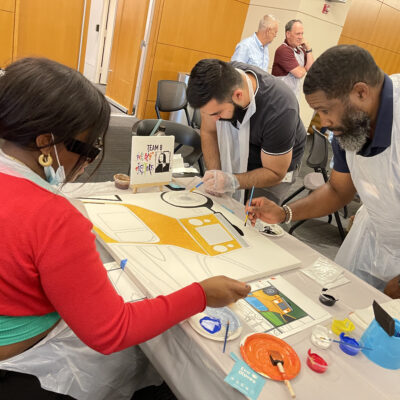Have you ever noticed how workplaces with great team cooperation seem to effortlessly achieve their goals? Likewise, workplaces with poor cooperation often struggle with endless conflicts and missed opportunities.
The good news is that any team can improve workplace cooperation and communication. It starts with creating a work environment that supports collaborative cooperation. And while this doesn’t come naturally to most teams, it’s typically well within reach.
This article explores what good team cooperation in the workplace looks like. We’ve also highlighted our top seven tips for improving team cooperation and collaboration skills in the workplace.
What Is Team Cooperation?
Team cooperation in the workplace is a multifaceted skill that requires effort from everyone involved. It’s influenced by factors like:
- How employees participate in decision-making
- How management and employees work together to resolve conflicts
- How all levels of the organization work together to achieve common goals
In other words, cooperation in team dynamics refers to the seamless alignment of each employee working with others towards a common goal. Each person must contribute their unique strengths and do the same for their colleagues.
Here’s a breakdown of what that entails.
Communication
Open communication is essential in any situation where you must work with others. It makes cooperating and collaborating easier by keeping everyone on the same page regarding their responsibilities and the team’s goals. It also creates a sense of mutual respect and understanding, which makes it easier to resolve any issues that may arise.
Trust
Mutual trust is the glue that holds good teams together. It’s essential for good communication and collaboration in the workplace. Building trust creates a safe space where each person feels comfortable and psychologically safe when sharing their ideas and opinions without fear of judgment or criticism. This encourages creativity and innovation because team members are willing to share bold or innovative ideas.
Teamwork
Cooperation and collaboration are essential for good teamwork and vice versa. In cooperative teams, all members feel accountable for the team’s success. Instead of working in silos, they collaborate, exchange ideas, and provide support to ensure the team progresses. This allows the team to tap into each member’s unique strengths and expertise to achieve their common goals.
How to Improve Team Cooperation in the Workplace: Top 7 Tips
Sure, team cooperation sounds fantastic, and you’d honestly love to see good communication, trust, and teamwork in your company. But how do you improve collaboration in the workplace?
It’s never going to be as easy as pushing a button or throwing money at the situation, but it’s actually a very achievable goal. There are many activities and steps that leadership and employees can take together to improve cooperation in the workplace.
At TeamBonding, we’ve spent over two decades helping companies build up their teams, improve collaboration, and train team members to cooperate effectively. Here are the top seven tips we’ve picked up along the way:
1. Make Teamwork and Cooperation Part of Your Workplace Culture
Successful collaboration between coworkers requires the leadership to make team cooperation one of the company’s key values. It’s essential for employees to see that the company’s leaders rely on collaborative cooperation to accomplish goals as a team. The company’s leadership should also recognize and reward teams publicly for successful teamwork.
Teamwork and collaboration must be a central theme of the corporate culture to improve team cooperation. To truly improve cooperation skills, leaders need to change their mindset and create an environment where employees feel safe sharing their ideas.
In a recent episode of our Team Building Saves the World Podcast, TEDx speaker and communication expert Aden Nepom shared insights from her experience teaching thousands to communicate effectively. She emphasized the crucial role of the leadership mindset:
“I think for leaders, it’s important to be a resource for your team. How are you setting your team up for success? How are you making yourself available to them rather than a top-down approach?
When you’re interacting with the other people on your team, if your mantra is, ‘Oh, here comes Bill again,’ are you creating an environment of psychological safety where people are welcome to share their ideas and poke holes in your ideas? Probably not. So, if you change your mantra only slightly to, ‘Here comes Bill, I wonder what he has to say,’ There’s a tonal difference that matters. That’s just a quick example.”
2. Provide Teams With the Resources They Need To Work Collaboratively
If you want to see your teams cooperating and collaborating effectively, you need to provide the resources needed to make this happen. This includes:
- Digital collaboration platforms: Online collaboration tools like Slack, Microsoft Teams, and Asana enable quick, organized communication across departments. They’re also fantastic for remote and hybrid workplaces thanks to real-time chat, asynchronous communication, file-sharing, and project management.
- Dedicated collaboration spaces: Creating comfortable workspaces where teams can meet and work together without disruption is essential. These spaces should facilitate everything from planned meetings to spontaneous collaboration with everything in between.
- Remote work infrastructure: If you have a remote or hybrid workplace, or if your employees are often spread out across different locations, they need a remote work infrastructure. That means reliable internet connections, video conferencing tools, and necessary hardware to make distance irrelevant.
By providing these resources, the company makes it clear that it cares about cooperation in team dynamics and that leadership is willing to go the distance to make it happen. This makes it part of your workplace culture, which also helps with the first tip.
3. Train Employees and Encourage Ongoing Learning
Working as a collaborative team member isn’t a skill that everyone is born with, and that’s okay! It’s imperative for any organization to invest in each employee’s ability to participate in effective collaboration. Leaders can make this happen with interactive training sessions and team building activities.
You might also encourage employees to participate in professional development programs to help them learn better communication skills through public speaking. These skills can increase confidence and give team members the ability to articulate their points more clearly. If the programs are completed as a group, they can also help your team members bond.
4. Encourage Employees To Socialize Outside of Work Situations
Employees are typically focused on the task at hand when they’re working—this leaves little time for them to bond on a personal level. Team cooperation and collaboration work much better if people get to know each other outside of these situations.
Don’t expect your employees to get together on their own, though. You have to make it happen! It can be as simple as Friday happy hours and casual lunches or as in-depth as community bonding events so they can make a difference together.
Participating in these social events breaks down barriers in the office and improves team cooperation in the workplace. When coworkers build trust and feel more comfortable with each other, they naturally improve their collaboration.
Getting together outside of work and building strong relationships has a huge positive impact on team dynamics and the work they do in the office. If you need help engaging your team and planning an event, make sure to check out our professionally facilitated team building events.
5. Clearly Define Roles and Expectations
It’s important to make sure each employee understands their role within the organization and those of their team members. When all employees are on the same page, team collaboration becomes a more seamless and natural process.
When employees have clearly defined roles and expectations, they can understand the big picture and how they contribute to it. When a person understands how they’re helping, they’re more likely to fulfill their role. In other words, they become more engaged.
Just as it’s important for leadership to set clear expectations regarding teamwork and collaboration, teams also need clear expectations and roles for specific projects. Everyone should be clear on which goal or objective needs to be reached and when.
6. Review Individual Talents
Great leaders are familiar with the skills of every employee. This allows them to place their team members in settings where they can add the most value to the organization.
For team cooperation, identifying each individual’s strengths also allows you to place them with coworkers who will complement and challenge those strengths. When each team member is the best at what their role is within the team, you will see them producing results above your expectations.
7. Resolve Team Conflict Quickly
No team will ever be perfect and free of conflict at all times. As such, it’s crucial for leaders to have a system in place to handle any conflicts that arise as quickly as possible. This system should allow employees to share their concerns without repercussions at all times and to have input on solutions to conflict implemented by the organization.
This isn’t just about communication or workplace morale, either. Conflict resolution is important for your bottom line. According to the Workplace Peace Institute, US employers lose more than $1.5 million in productivity every year due to workplace conflict. That breaks down to more than $3,215 per employee.
Employees who know there’s a system in place to address conflict can trust that any dispute will be handled fairly. This lets them work with other team members in a healthy and collaborative manner without fear of repercussions, drama, or workplace toxicity.
Boost Teamwork and Cooperation with TeamBonding
While poor team cooperation in the workplace is common, it’s far from an insurmountable problem. With the right approach, leaders can foster collaboration and communication to create a happier, healthier workplace.
These seven tips are a great start, but if your teams are actively struggling with cooperation in the workplace, support from experienced team building professionals can be a huge help. At TeamBonding, we’ve spent 25+ years transforming group dynamics and unlocking potential for organizations and teams of all types. We have team building experiences for every situation.
Are you ready to strengthen your team’s cooperation skills? Contact us today to discuss how we can help.
















